-
An Introduction to Sustainable Materials Management
If you’re interested in reducing how much waste ends up in your company’s dumpsters in Atlanta , then you may benefit from learning about sustainable materials management.
Sustainable materials management (SMM) is an approach designed to utilize materials more effectively and efficiently throughout their lifecycle. The SMM model examines how materials are manufactured and how they can be used and reused in a way that is more productive and sustainable. Some of the strategies that are implemented in the SMM approach include reducing material toxicity to make it more environmentally friendly, getting more value out of materials by using them more wisely, and sourcing materials with consideration for the world’s needs in the future. The SMM approach begins from the start of a material’s life cycle, including how it is extracted and manufactured, and it continues through its distribution, usage, and disposal.
More specifically, the Environmental Protection Agency’s Sustainable Materials Management Program for fiscal years 2017 to 2022 prioritizes the areas of the built environment, sustainable food management, and sustainable packaging. Finally, the program’s goals involve decreasing disposal rates, reducing environmental impacts, increasing socio-economic benefits, and increasing the ability of various groups to implement the SMM approach.
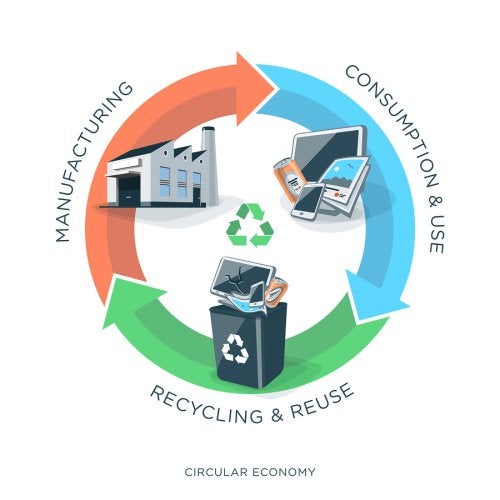
-
A Brief Guide to Greenhouse Gases
Did you know that recycling everything from food to electronics can help reduce greenhouse gas emissions? While recycling technology and waste disposal practices continue to improve, many people aren’t aware of the ways that waste management can affect the environment. If you’re interested in embracing better waste management in Atlanta and want to know more about its effect on the environment, then keep reading for a quick overview of greenhouse gases.
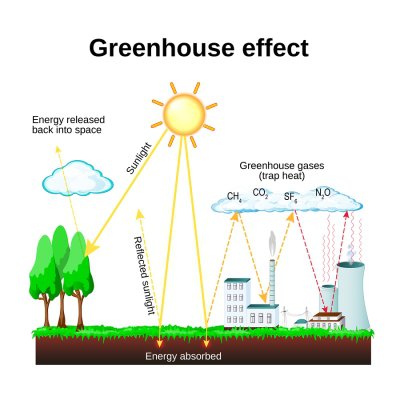
What Greenhouse Gases Are
Any gas that causes heat to be trapped in the earth’s atmosphere is referred to as a greenhouse gas. Some of the most prevalent greenhouse gases include carbon dioxide, nitrous oxide, and fluorinated gases. The greater the rate of emissions for a particular greenhouse gas, the higher its concentration will be in the atmosphere. Different gases remain in the atmosphere for different lengths of time, and the warming effects of various gases can differ.
Where Greenhouse Gases Come From
According to the U.S. Environmental Protection Agency , some of the economic activities that most contribute to the production of greenhouse gases are transportation, electricity production, industry, and agriculture. Also, most of these greenhouse gas emissions are in the form of carbon dioxide, followed by lesser amounts of methane, nitrous oxide, and fluorinated gases.
Why Greenhouse Gases Matter
Climate change is a natural phenomenon, but the greenhouse gases produced by human activity may drive global warming in an unnatural way. Through activities like raising livestock, driving cars, using energy, and managing waste poorly, human activity can produce greenhouse gases that may promote global warming.
What You Can Do
While climate change is a global issue, there is plenty that you can do in your day-to-day life to help minimize your contribution to greenhouse gas emissions. Some examples include recycling, reducing and reusing, choosing energy-efficient home appliances, switching to LED light bulbs, carpooling, and buying products that have less packaging. Other ways to do your part include driving an electric hybrid vehicle, telecommuting to work, and turning the thermostat up or down by a few degrees when you go to sleep or leave the house for the day.
-
Tips for Conducting a Waste Audit at Your Business
For businesses that want to have a greener image and cut operating costs by reducing the amount of waste they produce, waste audits are an essential tool. If you’re planning to conduct an audit for waste in Atlanta , then keep reading for some helpful tips.

Set Your Goals
When preparing for a waste audit, it’s a smart idea to determine what you would like to learn from the process. Typically, waste audits are used to identify how much of what types of waste are being generated, the effectiveness and efficiency of current waste management practices, and areas for waste reduction.
Plan for Safety
As exciting as it is to find new ways to waste less and recycle more, it’s important not to dive into the waste audit process without learning how to conduct the audit safely. Learn what safety precautions, such as vaccinations and personal safety equipment, are necessary for the type of waste you will be dealing with and ensure that your team is educated and prepared.
Create a System
To conduct your waste audit accurately and efficiently, you can benefit from mapping out the steps you will take. If you’re not sure where to start, then do a web search for waste audit templates that can provide you with a foundation to build from. Next, create a step-by-step plan and be sure that everyone on the waste audit team understands the process you will use and the audit’s objectives.
Scrutinize the Data
The information that you obtain from the waste audit can be invaluable for making big changes in your business’ waste generation. For this reason, you should take the time to analyze all the data from different angles to get the most benefit from the process. Lastly, be sure to organize the information and keep it available, so that you might refer to it and evaluate your company’s progress the next time you conduct a waste audit.
-
Strategies for Going Green at Your Business
Choosing eco-friendly products, recycling, and reducing waste in the workplace can be good for both the environment and your bottom line. If you’re hoping to go green at work and cut down on your company’s waste in Atlanta , then watch this video for some smart strategies to consider.
You can start going green by looking for non-toxic cleaning and bathroom products, which can promote better indoor air quality. To save money on operational costs, consider switching to energy-efficient light bulbs, motion sensor lights, and on-off sensors for faucets. Next, to reduce waste, avoid using disposable utensils, plates, and cups in your break room. Finally, look into what incentives for going green are available for businesses in your area.
-
Tips for Launching a Food Recycling Program
While you may be familiar with the process of recycling paper, plastic, and metal items, you may be surprised to learn that food waste can also be recycled. In fact, food waste recycling serving Atlanta is helping many businesses cut down on their total waste, while also providing valuable compost to local farmers. If your company handles food on a daily basis, consider setting up recycling bins to handle your extra food scraps and waste. Here is a look at some essential tips that will help you to launch a food recycling program for your business.

Learn About What Types of Foods Can Be Recycled
The food recycling process only works with certain items. Before you launch a food recycling program for your business, make sure to read up on what types of foods can be placed in your recycling bin, and which types must be thrown in the trash. Some examples of foods that can be recycled include fruit, vegetables, and baked goods. Meat and fish, by contrast, cannot be recycled.
Conduct a Thorough Waste Audit
Before you start recycling food at your facility, you will need to provide your recycling company with a thorough waste audit for your business. During your waste audit, you will take note of the types of waste that are typically generated throughout your workday, as well as the total volume of waste that you end up tossing at the end of each shift. Your waste audit will help your recyclers determine the proper size for your food waste recycling bins.
Consider Your Overall Cost Benefits
In addition to helping promote local farmers, food waste recycling can also provide great cost savings for your business. Your company may be paying a monthly rate to dispose of food waste and other trash at the landfill. By diverting much of your food waste to a recycling program, you will be able to cut down on your waste disposal costs significantly.
-
Examining the Impact of Recycling
Recycling a single water bottle can have a major impact on the health of the planet. In this video from Seeker, you will take a look at the importance of recycling around the globe. When plastic bottles are sent to a recycling center serving Atlanta , they can be processed and reused to create new items. By contrast, a plastic bottle that is tossed in the trash will never biodegrade, and will, instead, take up space in the landfill.
After you have learned some essential recycling facts, you may be tempted to recycle at your home or business. With services from a qualified waste management company, you will be able to set up an effective and simple recycling program that helps you to reduce, reuse, and recycle your materials.
-
A Look at How Electronic Waste Is Recycled
Every year, up to 50 million tons of electronic waste products are thrown into landfills. In this video from Tom Mills, you will learn all about the importance of electronic waste recycling. Electronic devices contain harmful materials, which can be safely eliminated through the recycling process. A company that provides recycling bins in Atlanta can help you to create an E waste recycling program for your business.
If you are looking for a safe way to get rid of your old computer, television, or cellphone, do not hesitate to get in touch with a local recycling center. When you recycle, rather than toss, your electronic items, you can create valuable metal recycling resources. E waste recycling is also an effective strategy for keeping hazardous metals and chemicals out of the environment.
-
The Benefits of Initiating a Recycling Program for Your Apartment Building
When you own or manage an apartment building, your waste management and recycling strategies will impact the daily lives of many other families. If your apartment complex currently does not offer recycling services, you may want to consider setting up a program that allows every tenant to recycle. By renting recycling bins in Atlanta , it will be possible to create an apartment recycling program that is manageable and simple for every tenant who lives in your building. Let’s take a closer look at some of the benefits of initiating a recycling program for your apartment building.
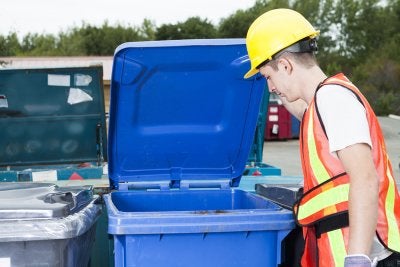
Cut Down on Costs
One of the top benefits of setting up a recycling program in your apartment building is that consistent recycling can help to save you and your fellow tenants money on your trash pickup fees. Typically, apartment residents must pay a monthly fee to have their trash picked up by a waste management company. When you commit to a recycling program, you can cut back on the costs that are associated with your trash pickup.
Improved Sense of Community
Implementing a new recycling program is a terrific way to build a stronger sense of community amongst your fellow tenants. By encouraging the members of your apartment building to recycle, you can help to create a sense of teamwork and cooperation. After you and your fellow residents have recycled consistently for several months, you may even find that your apartment building offers the sense of an improved quality of life.
Reduced Environmental Impact
Whether your goal is to help your apartment building to go green, or you simply want to cut down on waste and reduce energy consumption, a recycling program will help to improve the environmental impact of your residence. Having a structured recycling program can even help to attract new tenants who are committed to helping the environment and improving their surroundings. Overall, you will find that your apartment building produces much less landfill waste after your recycling program has been implemented.
-
Waste Reduction Tips for Office Buildings
Over the course of an average workweek, your office building may generate considerable amounts of solid waste. Some examples of common office building waste products include litter, paper products, and electronic goods. By encouraging your employees to recycle and scheduling weekly trash pickup services, you can cut back on the waste that your office building sends to the landfill. A company that offers waste management services can help you create a targeted plan that will help you cut back on your office waste near Atlanta. Read on for an overview of some helpful waste reduction tips to implement in your office building.
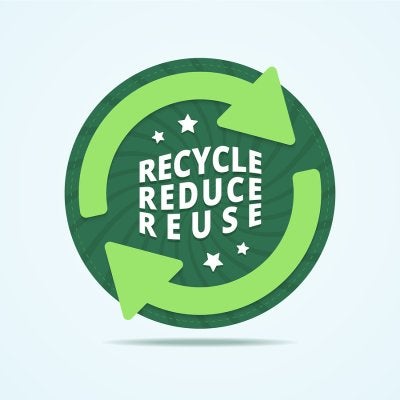
Encourage Electronic Communication
In today’s digital era, many forms of business communication can be completed online or over the phone. In order to reduce waste in your office building, you may want to encourage your workers to rely on electronic forms of communication, rather than printed memos and faxes. By cutting back on the number of paper letters and memos that you print out every day, you can achieve terrific waste reduction over the course of a business year.
Maintain Your Office Supplies
Office supplies, such as staplers, pens, and glue sticks, will all take up space when they are tossed in the trash and sent to the landfill. To cut back on the waste that is created by your office, you may want to encourage your workers to take care of their office supplies. Capping pens, avoiding stapler jams, and closing up glue containers will help these supplies last longer before they have to be tossed.
Create a Recycling Program
Recycling is one of the best ways to reduce office waste and help the environment. When you create a new recycling program for your business, you will need to make sure that all of your workers are on board with the plan. Along with placing recycling bins throughout your office space, you may want to hold a meeting where you discuss the importance of recycling. Creating recycling incentives and rewards can also help to encourage your workers to recycle.
-
Answering FAQs About Industrial Solid Waste
If you own or manage an industrial plant or factory, your waste management will typically be monitored by the EPA or another federal organization. To make sure that your waste management procedures comply with federal regulations, you should work with a company that specializes in managing industrial waste near Atlanta . Your waste disposal company can help you create onsite solutions and collection plans for all of your solid waste. Let’s answer some of the most commonly asked questions that business owners have about their industrial solid waste.
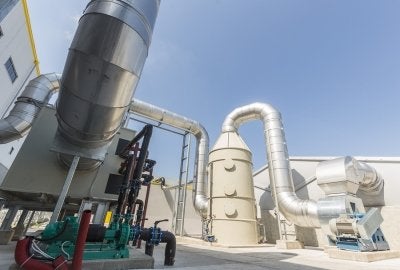
What is the definition of industrial solid waste?
In order to properly manage your industrial solid waste, it is helpful to understand how this category of waste is defined. Typically, industrial solid waste is categorized as any waste product that is in a solid, partially solid, or enclosed gaseous state after it has been generated. In order for waste to become labeled as industrial solid waste, it must be produced during an industrial or manufacturing process.
Are there methods for reducing industrial solid waste?
Many industrial businesses are interested in reducing the amount of solid waste that they create during their daily operations. Solid waste reduction can help to make a company’s manufacturing process more efficient, and waste reduction is also environmentally friendly. To reduce solid waste production, it may be possible to install new machinery that is designed to be more efficient, using fewer resources. Proper facility maintenance can also go a long way towards reducing solid waste in an industrial setting.
How can solid industrial waste be managed?
An experienced industrial waste management company can provide you with disposal and pickup services that will help to streamline your solid industrial waste management. Rather than relying on onsite services for proper containment and disposal, you can hire your waste management professionals to pick up, sort, and dispose of your solid waste using the latest waste management technology. Outsourcing your solid industrial waste management will help you ensure that your waste management plan complies with federal regulations.
RECENT POSTS
categories
- Uncategorized
- Waste Management Atlanta
- Waste Disposal and Recycling
- Hazardous Waste Disposal
- Chemical waste removal
- solid waste removal
- R3 Program
- Sustainable Organizations
- Sustainable Waste Removal
- Commercial Waste Removal
- Materials Management Program
- Dumpster Rental
- Roll Off Dumpsters
- Construction Site Waste Removal
- Sustainability
- Recycling in Atlanta
- Industrial Recycling
- Industrial Waste Removal Services
- Southern Waste & Recycling
- Waste Removal Atlanta
- Waste Specialists
- Atlanta
- Infographic
- Front Load Dumpsters
- Rear Load Dumpsters
- Reusable Electronics
- Dump Truck Atlanta
- Recyclable Electronics
- Trash Compactors
- Recycling
- Recycling Program
- Office Recycling
- Metal Recycle
- Electronic Waste
